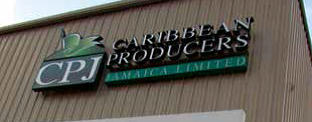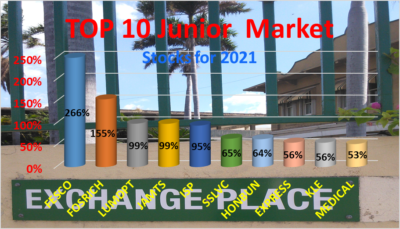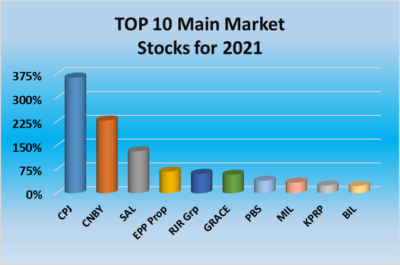The Junior Market is trading at record high at the start of Monday trading at 3,700.02 points after surging 114.27 points and exceeding the record close of 3,662.94 points on August 14, 2019.

New record high for the JSE Junior Market.
The JSE Main market All Jamaican Composite Index jumped 3,232.66 points to trade at 442,490.38 within 25 minutes of the opening.
In trading Access Financial Services is up by $1 to $26, Caribbean Insurance Brokers rose 24 cents $2.90, Dolphin Cove gained to $1 to $23, Fosrich was up 21 cents to $14.44, Fontana gained 33 cents to $8, Lasco Distributors rose 12 cents to $3.25, Lasco Financial is up 21 cents to $3.27 followed by Lasco Manufacturing is up 38 cents to $4.98. Main Event rose 50 cents to $4.50, Paramount Trading rose 21 cents to $1.62 and SSL Venture Capital rose 41 cents to $1.69 following news of a proposed acquisition of 79 percent of the company’s shares.
In the Main Market, Caribbean Producers rose 61 cents to a new high of $16.50 and NCB Financial put on $2.13 to $130.
The Junior Market rise conforms to ICIsider.com report that the market was poised to make a big break from the consolidation around the 3,300 points mark and head to over 4,000 points.
 Investors kept up the bullish stance in trading on the Jamaica Stock Exchange on the first trading day of the year with the All Jamaican Composite Index surging 8,895.04 points to 447,223.41, up from 438,328.37 at the close on Friday, with the Junior Market index(AJI) rising 45.88 points to 3474.18 from 3,428.30 on Friday.
Investors kept up the bullish stance in trading on the Jamaica Stock Exchange on the first trading day of the year with the All Jamaican Composite Index surging 8,895.04 points to 447,223.41, up from 438,328.37 at the close on Friday, with the Junior Market index(AJI) rising 45.88 points to 3474.18 from 3,428.30 on Friday.
 Caribbean Producers was switched from the Junior Market in July this year to the Min Market with the price under $5 and ended the year as the best performing stock in the overall market with a towering gain of 364 percent with the price closing at $13. Had the switch not taken place the Junior Market would have recorded greater gains than it did. Ciboney rose 221 percent as investors speculated heavily on it and
Caribbean Producers was switched from the Junior Market in July this year to the Min Market with the price under $5 and ended the year as the best performing stock in the overall market with a towering gain of 364 percent with the price closing at $13. Had the switch not taken place the Junior Market would have recorded greater gains than it did. Ciboney rose 221 percent as investors speculated heavily on it and 
 Caribbean Assurance Brokers was frozen at $2.95, the stock traded at that price on Monday, Consolidated Bakeries was frozen at $1.53, iCreate is frozen as the price dropped to 75 cents, Jetcon Corporation freeze took place at $1.08 and KLE Group at $2.30 from $3.10 on Monday but it traded as low as $2 on the 25th of the month. None of the stocks traded outside the recent range, so what is the Stock Exchange preventing these stocks and many others from trading freely as there is no information that is not already known to the market.
Caribbean Assurance Brokers was frozen at $2.95, the stock traded at that price on Monday, Consolidated Bakeries was frozen at $1.53, iCreate is frozen as the price dropped to 75 cents, Jetcon Corporation freeze took place at $1.08 and KLE Group at $2.30 from $3.10 on Monday but it traded as low as $2 on the 25th of the month. None of the stocks traded outside the recent range, so what is the Stock Exchange preventing these stocks and many others from trading freely as there is no information that is not already known to the market. “The
“The  The general rule; buy stocks with low PEs and stay away from those with high PEs and monitor them regularly to see if there are significant changes that may warrant changes in an investment.
The general rule; buy stocks with low PEs and stay away from those with high PEs and monitor them regularly to see if there are significant changes that may warrant changes in an investment.
 Jamaica’s sole cement producer Caribbean Cement hit a record high of $147.12 in today’s early trading and was suspended after the JSE circuit breaker was triggered. The stock, which closed on Thursday at $112, has risen 31 percent for the day.
Jamaica’s sole cement producer Caribbean Cement hit a record high of $147.12 in today’s early trading and was suspended after the JSE circuit breaker was triggered. The stock, which closed on Thursday at $112, has risen 31 percent for the day. 

 The Jamaica Stock Exchange Junior Market suffered a big reversal in the market index, pushing it down 64 points in early trading to 3,223.96 from the close on Tuesday at 3,287.50, with the fall of Express Catering from $5 close Tuesday to $3.65 this morning that led to an automatic freeze in the stock at 9.35 am.
The Jamaica Stock Exchange Junior Market suffered a big reversal in the market index, pushing it down 64 points in early trading to 3,223.96 from the close on Tuesday at 3,287.50, with the fall of Express Catering from $5 close Tuesday to $3.65 this morning that led to an automatic freeze in the stock at 9.35 am.




Wigton price collapses
Wigton Windfarms’ shares traded below the IPO price of 50 cents on Friday as attempts to shield the price from falling after announcing a drop in revenues is finally giving way to selling pressure. The Wigton syndrome continues to plaque the Jamaica Stock market with irrational behavior of investors to be seen in the prices of many stocks.
Wigton traded nearly 90% of shares on Thursday.
On August 25, investors bought 5 million shares of Future Energy, up to $2.85 and for the next two trading day’s they just over 10 million units up to $3.29, with 15 million shares trading on the 30th at an average of $2.96. The stock is now trading at $2.04, with a PE ratio of 16, to be one of the more highly priced Junior Market stocks. What is happening here, when viewed against stocks with much lower PEs and good growth prospects?
 There are thousands of new investors in the market brought on by several new listings on the market, with most listings creating good returns in a relatively short time for early investors.
There are thousands of new investors in the market brought on by several new listings on the market, with most listings creating good returns in a relatively short time for early investors.
Radio Jamaica another stock that traded as high as $4.65 on August 25, traded on Friday at $3.11 at a PE ratio of 7. Salada Foods continues to trade around the $7 region at a PE ratio of 43 times current year’s earnings. Wigton Windfarms that investors were not informed until late last year that the contract for their number 2 turbine provide for a reduction in rates for the supplying of electricity to JPS, belatedly traded down to 46 cents on Friday with few bids left in the system, and now trades at a PE of 12.5.
The stock market is a wonderful creation that has helped to enrich participants over the years, like any endeavor the more time spent studying and understanding it the better off those investors will be.
In the past, investors and scholars developed systems and methods to act as a guide to better investment decisions and thus reduce the love or dislike for a stock or other types of investments and thus reduce emotional decisions.
Technical analysis is a very useful tool used in the investment arena that carries coded messages for persons who understand them. They help investors to avoid excessive behavior in markets and telegraph future trends by using past market movements as the base.
The recent price movements for Radio Jamaica and Fesco show them breaking out of a channel that goes back for months, both companies released results that were price movers and both broke out, with the market not fully there as yet as prices moved too far too fast as such prices pulled back.
A few months after Wigton shares were listed in 2019, ICINsider.com wrote a piece to help investors better understand stock market behavior and prevent losses in the market. The piece captioned “Wigton price dreamers” was published in May of 2019. In light of the irrational trading in Fesco and Salada shares, elements of the article are highlighted below.
Salada Foods traded at a all-time high of $18 on Tuesday.
“Buy now, Ride the $3 wave”. That is the advice of one online investor to another, regarding the likely performance of the Wigton Windfarm stock after trading, on the first day of listing at 83 cents with a PE of 14, placing the value in the upper half of the most valued main market stocks. The premium over net asset value another measure of valuation is 291 percent above the net asset value. At $3, the stock would trade at a stunningly high PE ratio of 50 times 2019 and 2020 earnings. The only main market stock close to that valuation is Kingston Wharves (KW) at 35 times 2019 earnings and that is coming down from more than 50 times 2018 earnings when it traded at $85.
Unlike KW, which has less than 10 percent of the shareholding that will trade, amounting to a few million units, Wigton has billion of shares that will trade. The high liquidity of the shares almost ensures that they will not become overvalued.
Most investors who would be big buyers are more professional and are versed in the valuation levels of stocks. Accordingly, they are unlikely to be buying a stock that has doubtful expansion credentials at an inflated value. The most popular valuation tool, the PE ratio does not support a price much higher than $1.20, with EPS of 60 cents per share. A price of $1.20 equates to a high PE ratio of 20. Only a few stocks are valued close to this multiple and many of them have prospects for profits to grow. Wigton has no immediate prospects for growth in earnings, pricing it at 20 times EPS would therefore be unwise. The market will speak but the heavy selling on Friday when it first traded is more in line with the thinking that the top is not far off. Investors who buy shares above the accepted market norm will likely get crushed.
In the investment world staying close to the crowd with pricing is a prudent investment practice that tends to be less costly than trying to predict lofty heights for stocks to reach.
PE ratios are there to give a sense of appropriate values, when investors try to break away from where the bulk of investors place a value of a stock, they usually end up regret the move.